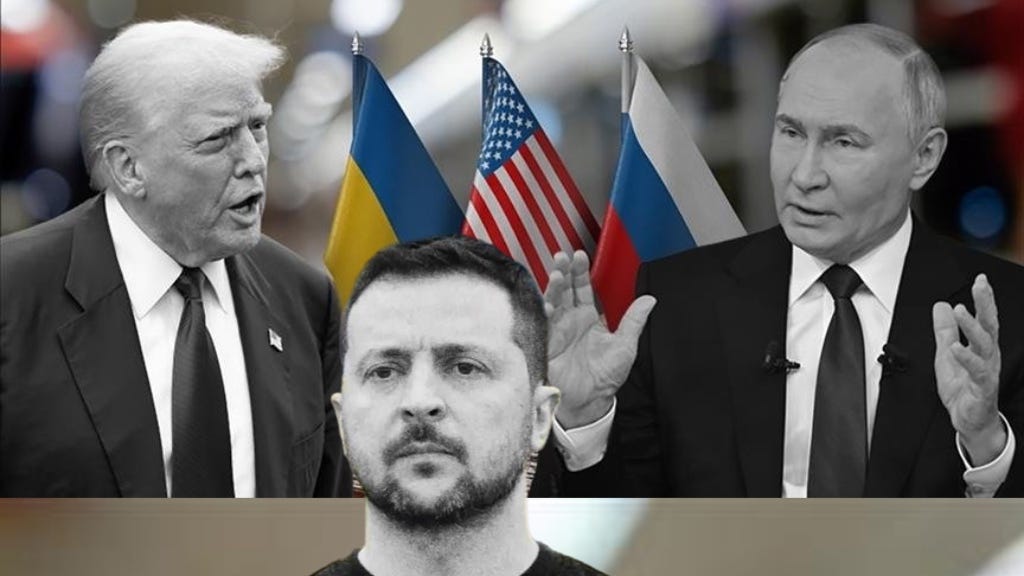Secret Trump-Russia Peace Deal Bypasses Ukraine, Sparks Sovereignty Crisis
28-Point Plan Negotiated Without Kyiv Raises Questions About America’s Commitment to Allies
In a stunning revelation that has sent shockwaves through European capitals and Washington’s foreign policy establishment, the Trump administration has been conducting secret negotiations with Russia on a comprehensive peace plan to end the war in Ukraine—without Ukrainian participation at the negotiating table.
The 28-point proposal, developed through backchannel discussions between American and Russian officials, would require Ukraine to cede significant portions of its sovereign territory to Moscow . The plan represents a dramatic departure from the Biden administration’s approach and from traditional American support for the principle that nations should not be forced to surrender land taken by military aggression.
Details of the plan remain closely guarded, but sources familiar with the negotiations indicate it would formalize Russian control over Crimea and substantial parts of eastern Ukraine currently occupied by Russian forces. The agreement would also reportedly impose restrictions on Ukraine’s future military capabilities and its aspirations for NATO membership—key demands that Russian President Vladimir Putin has maintained throughout the conflict.
The exclusion of Ukrainian officials from the negotiations has provoked outrage in Kyiv and concern among European allies. Ukrainian President Volodymyr Zelenskyy has repeatedly stated that any peace agreement must be negotiated with Ukraine at the table, invoking the principle of “nothing about us without us.” The secret talks appear to violate that fundamental diplomatic norm.
“This is not just about Ukraine,” said one European diplomat who spoke on condition of anonymity. “This is about whether agreements between nations mean anything, whether borders can be redrawn by force, and whether America can be trusted to stand by its commitments.”
The Trump administration has defended the initiative as pragmatic diplomacy aimed at ending a costly war that has claimed hundreds of thousands of lives and displaced millions. Administration officials argue that Ukraine lacks the military capacity to reclaim all occupied territories and that continued fighting only prolongs suffering without changing the strategic reality on the ground.
Critics counter that the approach rewards Russian aggression and sets a dangerous precedent. If territorial conquest can be legitimized through great power negotiations that exclude the victim, they argue, it invites similar aggression elsewhere—from China’s designs on Taiwan to other territorial disputes worldwide.
The plan also raises profound questions about the tens of billions of dollars in American military aid provided to Ukraine. Many Republicans in Congress supported that assistance based on assurances it would help Ukraine defend its sovereignty, not facilitate a negotiated surrender of territory. Democrats have expressed alarm that three years of American support may culminate in a deal that validates Putin’s invasion.
European allies face their own dilemma. Many have provided substantial military and economic support to Ukraine and accepted millions of Ukrainian refugees. A peace deal imposed without Ukrainian consent could fracture the Western alliance and undermine European security architecture built over decades.
The timing of the revelation is particularly sensitive, coming as Ukraine faces challenging conditions on the battlefield. Russian forces have made incremental gains in recent months, while Ukrainian forces struggle with ammunition shortages and personnel challenges. Some analysts suggest Russia may be calculating that Ukraine’s weakened position makes this an opportune moment to secure territorial gains through diplomacy.
The proposed agreement would need to address numerous complex issues beyond territorial boundaries: security guarantees for Ukraine, reconstruction funding, war crimes accountability, the status of occupied populations, and the future of Ukraine’s relationship with Western institutions.
Perhaps most fundamentally, the secret negotiations raise questions about what American commitments mean in the 21st century. The United States was a signatory to the 1994 Budapest Memorandum, in which Ukraine surrendered its nuclear weapons in exchange for security assurances from America, Russia, and the United Kingdom. If Washington now brokers a deal forcing Ukraine to surrender territory to its nuclear-armed neighbor, it would represent a bitter historical irony.
As news of the secret plan spreads, the coming weeks will test whether Trump can sell this approach to skeptical Republicans in Congress, anxious European allies, and an American public that has supported Ukraine’s resistance. Most critically, it will test whether any peace agreement can hold without the consent of the Ukrainian people themselves.
The fundamental question remains: Can peace imposed from above ever be lasting, or does it simply plant the seeds for future conflict?


